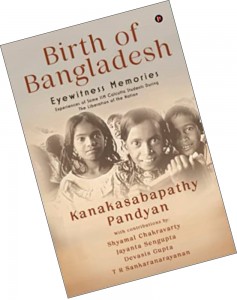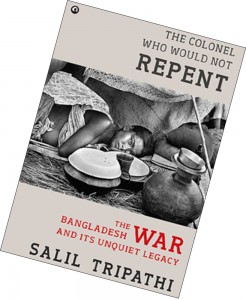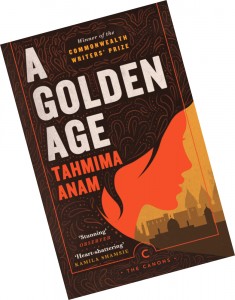Fifty Years of Bangladesh At a time when Russian President Vladimir Putin is trying to overwhelm a neighbour with brute force, here are some perspectives on the liberation of India’s neighbour.
December 16 of last year was a milestone in the history of Bangladesh. This was the day, 50 years ago, that the people’s rallying cry of ‘Joy Bangla’ metamorphosed into the reality of an independent nation. For a variety of reasons, it seemed a good time to rediscover the history of that country through the written word. With this in mind I asked for suggestions and book clubbers responded enthusiastically. Among the recommended titles were The Colonel Who Would Not Repent: The Bangladesh War and Its Unquiet Legacy by Salil Tripathi and a fictional trilogy by Tahmima Anam: A Golden Age, The Good Muslim and The Bones of Grace. Someone also pointed me to discussions on YouTube, one featuring Mahfuz Anam, Editor of the Bangladeshi newspaper The Daily Star — he, incidentally, is Tahmima Anam’s father — and another featuring… but we’re getting ahead of ourselves.
While Mahfuz Anam provided useful insight into India’s proactive role then, which contrasts starkly with the insipid relations prevailing today, it was the other discussion that piqued my interest. Who were Kanakasabapathy Pandyan (KP) and Shyamal Chakravarty (SC) featured, along with a couple of others, prominently and who spoke convincingly about the events of 1971? Thereby, as the cliché goes, hangs a tale.
Back in 1971, KP and SC were students of the Indian Institute of Management-Calcutta, having only just joined the prestigious institution. Like everyone else, especially in West Bengal, Assam and Delhi, they too had been following the action in East Pakistan. After all, many Bengali revolutionaries from across the border were regular visitors to Calcutta (Kolkata). When Pakistan’s Lt Gen A A K Niazi surrendered to India’s Lt Gen J S Arora and Bangladesh’s Air Commodore A K Khandker, there was much cheering in the IIM-C common room. Besides, several IIM-C students were already working at various camps catering to the urgent needs of refugees who had been pouring into India from across the border for months. So, what qualified KP and SC to be on the panel?
It turned out that KP had just published with Notion Press a book called Birth of Bangladesh: Eyewitness Memories, Experiences of Some IIM Calcutta Students During the Liberation of the Nation. While he wrote most of the book, there were contributions by SC, Jayanta Sengupta, Devasis Gupta and T R Sankaranarayanan. It was the story of how, one day after Bangladesh was born, KP, SC, and two others, S Clement and Ganesh Aiyyar, had set out to discover for themselves how it felt to be in a newly liberated nation! At ₹210, the book is a collector’s item. (Clement and Ganesh don’t feature among the contributors because, unfortunately, they had passed on by the time the book was published. However, they were integral to the daring exploits.)
KP writes in the book that after the cheering had died down in the common room, ‘… someone says, “We should go to Bangladesh now.” This is just a comment made in the heat of the moment. But it strikes a chord and triggers my question “Who is coming?” There is really no response to the question… Someone playing a game of chess says, “Are you mad, that’s a war zone, and not a safe place to go to”. Someone else says, “Come on, Indian Army has taken over the country and the news said the entire Pakistani Army has surrendered”. … I turn around and ask Clement who is sitting there with a newspaper in his hands, “How about it?” Clement takes his time answering. He is looking thoughtful. Suddenly he says, “Let’s do it”. It is so simple…’
But it’s not that simple: they need a Bengali speaker to go along. SC is roped in for this reason; Ganesh joins them, claiming he too speaks Bengali! A quick confabulation and they decide they need to move fast, before visas become necessary. They have no specific plans. They only know they want to get to Dhaka and that they will figure out details along the way. They each carry one change of clothes and fifty rupees in the pocket. They step out of the gates: Now, where to cross the border?!
To discover what the foursome discovered on their spontaneous adventure, read their account. It’s a riveting story.
All three titles in Tahmima Anam’s trilogy have drawn high praise. Khademul Islam of The Daily Star calls A Golden Age ‘the definitive 1971 novel’. The Good Muslim was a New Yorker best book of the year. About The Bones of Grace, Kamila Shamsie (author of the brilliant A God in Every Stone) says, ‘A novel of heart, brain and muscle — the compelling pulls of history and love are evoked here with a rare honesty and great skill.’ Lucid, moving, unhurried … these aspects are woven subtly into the delicately written narratives, told primarily through the experiences of three generations of a family. Sensitive and stark, they take on oppression, revolution, war, displacement, euphoria, disappointment, hope, both individual and collective, as the reader journeys through the complex world of being Bangladeshi.
Award-winning journalist Salil Tripathi’s nonfiction title (published 2014) was just the book I had been looking for, promising as it did to be a fair, rounded, objective picture of the social and political history of Bangladesh. The cover photograph by Raghu Rai is haunting, recalling the horror of that time for those of us who were old enough to remember. The title, equally haunting, refers to Lt Col Farooq Rahman who, on August 15, 1975, ‘led the Bengal Lancers, the army’s tank unit under his command, to disarm the Rokkhi Bahini, a paramilitary force loyal to Sheikh Mujib’ and then led a team of officers and soldiers on a killing spree to finish off Sheikh Mujib and his family. Only two daughters, one of them the current prime minister Sheikh Hasina, escaped because they were abroad at the time. Tripathi, who interviewed Farooq after he had returned to Bangladesh after years of exile in Libya, writes, ‘Farooq Rahman thought he was a patriot. He believed he had saved the nation. The governments that followed Mujib reinforced this self-belief and perception rewarding him and the other assassins with respectability by giving them political space, and to some, plum diplomatic assignments.’
Why the reference to ‘unquiet legacy’ in the title? Tripathi examines this in great detail in the context of the unique socio-cultural milieu of a region where people first identify themselves as Bengali. Its political development has been uneven since liberation, with ‘several coups, and the form of government (switching) from parliamentary to presidential to parliamentary again. … there have been times when it has been ruled by generals, or by a caretaker government comprising unelected officials.’ Gary J Bass, author of The Blood Telegram: India’s Secret War in East Pakistan (it’s on my battered Kindle) says Tripathi’s ‘powerful book is important reading for anyone trying to understand modern South Asia.’
All in all, a rich haul!
Postscript: In Dhaka, Clement buys local newspapers for their historical value. He also picks up a number of books, including Das Kapital. When they reach Gede, on the Indian side, they are stopped by two men claiming to be the police. They find Clement’s stash and suspect the four of being Naxalites. They confiscate the newspapers and books. And that is that. Clement is heartbroken.
The columnist is a children’s writer and senior journalist



